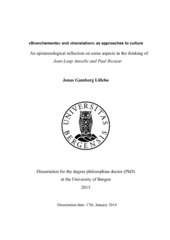| dc.description.abstract | In this dissertation I reflect on the concept of culture from a political, philosophical and anthropological angle. The perspective from where I attempt to analyze them all together is epistemological. This means two things: first of all it consists in a critical reflection that focus on the concepts and logics that constitutes the way we understand culture. One tendency is that the view of culture as something closed and static is being reproduced despite the intention or conviction that the opposite is true. This means that we have not fully comprehended that which hinders us in developing a non-essentialist thinking, or that we comprehend it but still have difficulties of articulating an alternative. A central objective in the dissertation is thus the description of the problem or epistemological obstacle that hinders the development of our thinking. Secondly, an epistemological perspective implies an attempt at taking this epistemological obstacle into account in order to supersede it and thus indicate a thinking about culture which does not work on essentialist premises. The question of obstacle and superseding this obstacle is a question of what kind of language we should use when we discuss culture. In order to do this I am scrutinizing the metaphor branchements as it is used by anthropologist Jean-Loup Amselle, and translation as it is discussed by philosopher Paul Ricoeur. Together they intervene into two aspects, or themes, central in the constitution of culture: identity and language. As I try to show do we need both a genealogical account for the constitutive role of identity and language on culture, and alternative ways to conceptualise them. The thesis aims at elaborating branchements and translation further by looking at the epistemological implications these notions could have for both understanding the hindrance and the overcoming of the hindrance. Culture seems to have a rather confused meaning depending on who discusses it, where and how it is discussed. Culture is conceived as both a problem and as a solution, as significant and insignificant to human beings, and it is conceived as both static and as dynamic. My philosophical contribution to this is to reflect on what we mean by the concept of “culture” when we discuss these questions and why the mixing of levels creates confusion as to what we are discussing and what kind of concept of culture we end up with. One central question in these discussions is if culture is static, pure and closed, or open and dynamic. If it is so that culture is open and dynamic, why is it still so difficult to break with the idea that it is closed? Why does a view of culture as something pure and closed seem to be reproduced? This question takes us into a philosophical and epistemological discussion on the conditions for thinking culture in a culturally diverse society. One of my claims is that the reason why the view of culture as closed is reproduced is the way culture is discussed in the political discourse. Because, here, in the political discourse, culture is linked to identity or a certain version of it: identity is placed within an oppositional logic. And this oppositional logic recognizes only that which is identical or different. Furthermore, when linked to culture identity becomes closely connected to the idea of origin suggesting that human beings must be understood as having a pure source as point of departure. It is when re-invoking identity and origin that culture can receive a role in the exclusion and inclusion into a society and thus becomes an obstacle to how we can think an open society. Even though the perspective of the dissertation is epistemological in the sense that I want to reflect critically on the link between culture and identity in the political discourse, I also want to go further than just describing this problem. Since what is at stake concerns the question of building and living in a society together this obstacle must be surpassed. Another kind of thinking should at least be attempted. In order to develop thinking that does not work on purity and closure as premises, we must be critical to the conditions that allow us to continue to think in terms of purity and closure, at the same time as a change of language for understanding culture is in order. The problem then becomes whether it is possible to think culture without purist and essentialist premises. The driving hypothesis of the dissertation is that the metaphor branchements, as used by Amselle in anthropology, and translation, as it is understood by Ricoeur, represent notions that can help us with this. Breaking with the idea of origina and identity-thinking in the early anthropology’s comparative method, raciology and the hybrid as metaphor for culture, branchements describes a network without a pure beginning or end. Translation on the other hand breaks with the obstacle of seeing languages either as diverse and untranslatable or as already united and translatable. It is my intention to discuss the obstacle of culture as an interlacing of anthropology and political discourse. I discuss how the use of metaphors and alternative terms (branchements, translation) in relation to practices (anthropological fieldwork, the practice of translation) helps anthropology to overcome its epistemological obstacles, how this obstacle has partly been transferred to the political discourse, and finally how the theoretical-practice of branchements and translation can helps us to develop another kind of thinking. | en_US |
